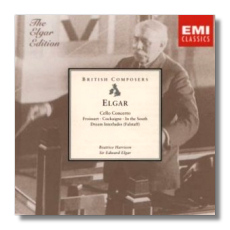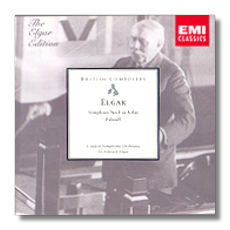
The Internet's Premier Classical Music Source
Related Links
- Elgar Reviews
- Latest Reviews
- More Reviews
-
By Composer
-
Collections
DVD & Blu-ray
Books
Concert Reviews
Articles/Interviews
Software
Audio
Search Amazon
Recommended Links
Site News
 CD Review
CD Review
Edward Elgar

The Elgar Edition
- 'Froissart' Overture Op. 19
- 'Cockaigne' Overture Op. 40
- 'In the South' Overture (Alassio), Op. 50
- Falstaff Interludes
- Cello Concerto in E minor, Op. 85
Beatrice Harrison, cello
New Symphony Orchestra & London Symphony Orchestra/Edward Elgar
EMI CDM 67298 75m ADD Recorded 1926-33


- Symphony #1
- Falstaff
London Symphony Orchestra/Edward Elgar
EMI CDM 67296 80m ADD Recorded 1930-32
There have been many fine and excellent recordings of 'In the South' after this landmark Elgar version of 1930 but listening to it for the first time proved a deeply emotional experience. It is a ghostly window on true Elgarian grandeur and heart-on-sleeve emotion, a truly grand recording and everywhere permeated with the magnificence that shines in every bar. Little touches such as the famous 'Canto popolare' theme are played with loving emotion and the build up at Tempo I from fig. 45 onwards is quite irresistible. If there is one Elgar recording that I would jump into the fire for then it would have to be this one. 'Cockaigne' and 'Froissart' are similarly fine, the latter is also imbued with a majestic swagger that also makes it authorative. Pages upon pages have already been written on Harrison's magisterial account of the Cello Concerto, I will just say that her account will probably never be surpassed and the 1928 sound is quite astonishing for its day with a believable presence for the cello and some chirpy details from the orchestra. There are also two short interludes from 'Falstaff' to make up proceedings, here we are back to 1926 and more wizardry from Andrew Walter who is also the chief annotater of the booklet notes.
The second disc under review contains the magisterial performance of the First Symphony coupled with 'Falstaff'. Both works were especially dear to Elgar's heart and the amount of knowledge and expertise poured into these recordings is well-nigh inimitable. Again certain details bewitch, sample the 'nobilmente' opening of the First Movement and the deeply felt eloquence of the Adagio molto filled with a vanished mystery of the Edwardian age. It is, in many ways an old fashioned reading but for me it brought pictures of the past with an all harrowing reality. Elgar's reading of the Finale is also taken at a hectic pace bringing out greater clarity and real excitement in the closing pages. His 'Falstaff' is also a marvelous image of that legendary Knight with all the bucolic humour and heart-rending sadness embroiled into a malleable whole that is in its own way, fascinating. The recordings have resurfaced with outstanding clarity and are remarkably free of surface hiss or extraneous noises, no doubt due to Michael Dutton's and Andrew Griffith's expertise in this process. I cannot wait for further versions in this unique Elgar edition.
When Elgar came to a recording session, he was stiffly reserved and at first tended to conduct with the minimum of movement and (so it appeared) of interest. But we always tried to get together much the same group of players from the London Symphony and the NSO and we almost invariably had Willy Reed at the first desk. ~ from Bernard Wratten's statement (who was present at the morning sessions) as told to Jerrold Northrop Moore
Surrounded by musicians he knew and were, some of them his friends, Elgar would gradually thaw and eventually, if all went reasonably well, he unbent a little. Sometimes, though not always, he would become caught up in his own music and he was then oblivious of his surroundings.
Copyright © 2001, Gerald Fenech


















